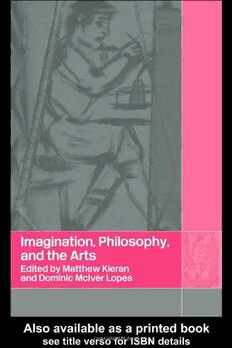Download Imagination, Philosophy and the Arts PDF Free - Full Version
Download Imagination, Philosophy and the Arts by Matthew Kieran in PDF format completely FREE. No registration required, no payment needed. Get instant access to this valuable resource on PDFdrive.to!
About Imagination, Philosophy and the Arts
Imagination, Philosophy and the Arts is the first comprehensive collection of papers by philosophers examining the nature of imagination and its role in understanding and making art. Imagination is a central concept in aesthetics with close ties to issues in the philosophy of mind and the philosophy of language, yet it has not received the kind of sustained, critical attention it deserves. This collection of seventeen brand new essays critically examines just how and in what form the notion of imagination illuminates fundamental problems in the philosophy of art. Imagination, Philosophy and the Arts tests the limits of the new theories of imagination and opens up several new avenues of inquiry. It is split into three parts: Part One discusses imagination in relation to our emotional responses to fictions and the nature of narratives; Part Two considers how imagination relates to conceivability, knowledge and understanding; and Part Three examines the ways in which imagination can be exercised through the senses. The volume will attract substantial interest in philosophers of art, as well as those working on mental representation, emotion theory, perception and fiction. Working with examples which include Edward Lear's The Owl and the Pussycat, Mahler's Seventh Symphony, and Oliver Stone's film JFK, these papers make a large contribution to developing our understanding of 'imagination' in new directions and setting the research agenda for the next decade. Contributors include: Berys Gaut, Stacie Friend, Peter Goldie, James Shelley, Saam Trivedi, Matthew Kieran, Derek Matravers, Kathleen Stock, Eileen John, Roman Bonzon, Dominic McIver Lopes, David Davies, Christopher Williams, Tamar Szabo Gendler, Robert Hopkins and Gregory Curry. Berys Gaut, Stacie Friend, Peter Goldie, James Shelley, Saam Trivedi, Matthew Kieran, Derek Matravers, Kathleen Stock, Eileen John, Roman Bonzon, Dominic McIver Lopes, David Davies, Christopher Willia
Detailed Information
| Author: | Matthew Kieran |
|---|---|
| Publication Year: | 2003 |
| ISBN: | 9780203352151 |
| Pages: | 330 |
| Language: | English |
| File Size: | 1.962 |
| Format: | |
| Price: | FREE |
Safe & Secure Download - No registration required
Why Choose PDFdrive for Your Free Imagination, Philosophy and the Arts Download?
- 100% Free: No hidden fees or subscriptions required for one book every day.
- No Registration: Immediate access is available without creating accounts for one book every day.
- Safe and Secure: Clean downloads without malware or viruses
- Multiple Formats: PDF, MOBI, Mpub,... optimized for all devices
- Educational Resource: Supporting knowledge sharing and learning
Frequently Asked Questions
Is it really free to download Imagination, Philosophy and the Arts PDF?
Yes, on https://PDFdrive.to you can download Imagination, Philosophy and the Arts by Matthew Kieran completely free. We don't require any payment, subscription, or registration to access this PDF file. For 3 books every day.
How can I read Imagination, Philosophy and the Arts on my mobile device?
After downloading Imagination, Philosophy and the Arts PDF, you can open it with any PDF reader app on your phone or tablet. We recommend using Adobe Acrobat Reader, Apple Books, or Google Play Books for the best reading experience.
Is this the full version of Imagination, Philosophy and the Arts?
Yes, this is the complete PDF version of Imagination, Philosophy and the Arts by Matthew Kieran. You will be able to read the entire content as in the printed version without missing any pages.
Is it legal to download Imagination, Philosophy and the Arts PDF for free?
https://PDFdrive.to provides links to free educational resources available online. We do not store any files on our servers. Please be aware of copyright laws in your country before downloading.
The materials shared are intended for research, educational, and personal use in accordance with fair use principles.

